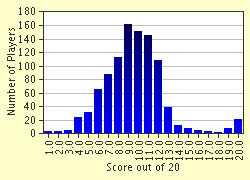Quiz Answer Key and Fun Facts
1. What are the four basic categories of surnames?
2. A patronymic surname is derived from which of these?
3. Which of the following English surnames is NOT patronymic?
4. Which of the following German derived surnames is NOT patronymic?
5. The common Cornish surname Angove is the equivalent of which English occupational name?
6. Names such as King, Duke and Bishop are which type of surname?
7. Which of the following surnames in NOT locational?
8. Which group of surnames would ALL be occupational?
9. The French surname "Dubois" is which type of name and what is its meaning?
10. Noel Coward's surname is of which type?
11. Which of the following surnames is now extinct?
12. The surnames Bevan, Bowen and Price have what in common?
13. The surnames Ivanovich, DiGiovanni, Evans and Jans have what in common?
14. Which of the following sets of names shows a patronymic, a locational, an occupational and a descriptive, in that order?
15. What modern European country does not have fixed surnames, but still uses a patronymic system?
16. What is the world's most common surname?
17. Animal surnames like Fox, Bear and Hart usually fall into the descriptive category. But what other category of surname are they occasionally derived from?
18. Hudkins and Hudson are both patronymics derived from what given name?
19. Saxby, Bransby and Colby are what type of surname?
20. Dutch surnames in New Netherlands could be confusing for what reason?
Source: Author
azazella
This quiz was reviewed by FunTrivia editor
Bruyere before going online.
Any errors found in FunTrivia content are routinely corrected through our feedback system.
